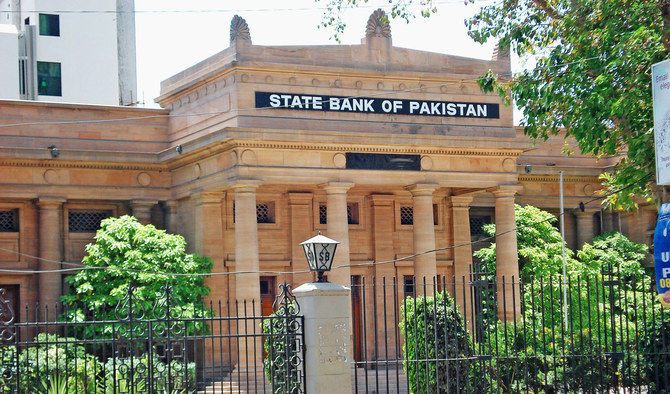KARACHI: Pakistan’s central bank on Friday ruled out any “sudden and higher” interest rate movements in the foreseeable future amid speculations that the International Monetary Fund (IMF) was likely to resume its $6 billion loan program for the country.
The bank decided to maintain the policy rate at 7 percent for the next two months, saying that domestic economic recovery had gained further traction.
“In the absence of unforeseen developments, the Monetary Policy Committee (MPC) expects monetary policy settings to remain unchanged in the near term,” Governor State Bank of Pakistan (SBP) Dr Reza Baqir told a news conference in Karachi.
“As the recovery becomes more durable and the economy returns to full capacity, the MPC expects any adjustments in the policy rate to be ‘measured and gradual’ to achieve mildly positive real interest rates,” he said while reading a document, adding that the MPC considered it appropriate to provide some forward guidance on monetary policy to facilitate policy predictability and decision-making by economic agents.
Last week, Baqir said the country was hoping for good news following talks with the IMF on the revival of fiscal stabilization program where concerns about future interest rates were also raised. The central bank’s forward guidance is meant to assuage such concerns of investors and business community.
Pakistan signed $6 billion, three-year Extended Fund Facility (EFF) with the IMF and has so far secured $1.44 billion under the loan program since July 2019. The country was expecting another tranche of about $450 million before the second review was put on hold about a year ago.
“We were in touch with the IMF at the technical level and the IMF also wanted fast economic recovery,” the SBP governor said, adding: “Now talks are going on with the IMF and when announcement would be made that our agreement on the review has been done its basic purpose would be to maintain the economic growth so that recovery could be stabilized.”
Despite recent electricity tariff hikes, the central bank said that inflation was expected to fall within the previously announced range of 7-9 percent during FY21, hoping that the trend would move toward the 5-7 percent target range over the medium-term.
Pakistan on Thursday increased the electricity tariff by Rs1.95 per unit, or 15 percent, which will also affect the base tariff for lifeline consumers using up to 50 units per month for the first time in almost two decades.
The SBP governor said, however, that the impact of these measures on inflation would be temporary.
“The rates have been increased in the past as well,” he added, “but we witnessed that their impact was temporary.”
He said the country had come out of the difficult stabilization phase and the economic activity data and indicators of consumer and business sentiment were reflecting continued improvement.
However, the MPC stressed in its report that considerable uncertainty remained part of the general economic outlook.
“The trajectory of the COVID pandemic is difficult to predict, given still-elevated global cases, the emergence of new strains, and lingering uncertainties about the roll out of vaccines worldwide,” the SBP statement read. “Such external shocks could slow the recovery.”
















